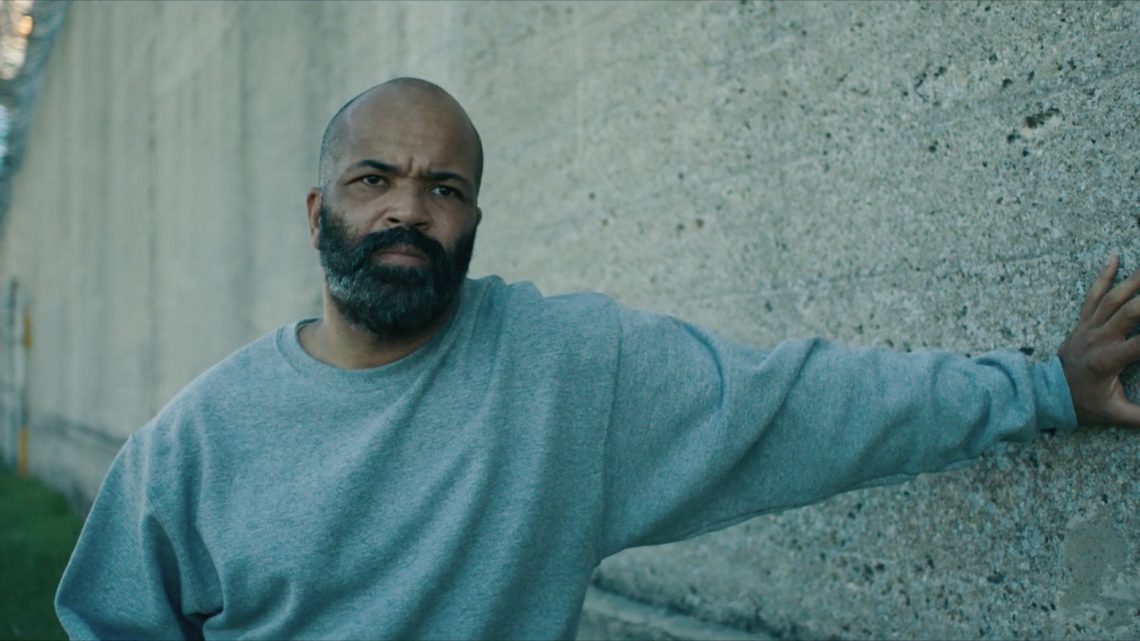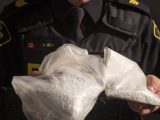
HBO’s New Film ‘O.G.’ Was Shot in an Active Prison
February 25, 2019Westworld star Jeffrey Wright has been acting since the early 1990s, and, in addition to that steady-and-possibly-sinister character, has a stunningly diverse array of roles under his belt—a steely Colin Powell in Oliver Stone's W, exacting and coldblooded villain Valentin Narcisse in Boardwalk Empire, artist Jean Michel Basquiat in Basquiat. But none of those chameleon-like performances prepared him for his role as Louis—a former gang leader who’s about to get out of prison after serving a 24 year sentence—in O.G., which premiered at the Tribeca Film Festival last summer and will made its television debut on HBO on February 23.
Filmed inside an active maximum-security prison, Pendleton Correctional Facility in Indiana, the movie, directed by Madeleine Sackler, used real prisoners and guards as actors. Wright’s co-star Theothus Carter—who plays Beecher, a new inmate being recruited by Louis’ former gang—is serving a 65-year sentence for attempted murder, burglary, and attempted robbery with serious bodily injury. VICE talked to Wright by phone to find out what it was like shooting a film in a real prison, how he developed chemistry with his felonious co-star, and how his opinion on prison and the criminal justice system changed since filming the movie. Here’s what he had to say.
VICE: When you were first brought this project, when you first got involved and were told what it would encompass, what were your immediate thoughts?
Jeffrey Wright: What drew me into it more than anything was the idea of working inside an actual facility and working with men who were on the inside. There's obviously a national dialogue right now about incarceration and criminal justice. I wanted to better inform myself on the issues and this seemed like an opportunity to do that. I also was curious about the challenge of being able to pull it off. Of being able to, on some level create a character that was authentic in an authentic setting. With men who knew more about the conditions around that character than I did. I wanted to see if I could get away with it. And because acting can become routine like anything else, this was an opportunity to shatter the routine, and work in a new way for me. A new way generally. I was drawn into it and was immediately compelled by the idea.
What was it like shooting at that Pendleton Correctional Facility in Indiana?
We shot for five weeks straight,13 hours a day on the inside. But the process began a year before filming when I first visited the prison to research and meet with the men who were incarcerated and listen to them. To understand why they might wanna be part of a project like this and to also hear their perspectives on the story that we were trying to tell. I visited the prison five times, a couple days each time to build that trust. Six months prior to filming I visited a couple of more times. We rehearsed for a week straight before we started filming, and then it was five weeks straight of grinding it out with this crazy little guerrilla film crew we had, and the men and women of the facility.
What were your interactions with the prisoners like, both onscreen and off?
On any given day I was surrounded by dozens of expert consultants on my character. We developed a strong positive working relationship [with a] free exchange of ideas about how things were going. The first scene we shot was [where] I walk across the yard out of the gymnasium and go lean on the wall observing the other men who are out on rec. After, one of the [real prisoners] came up to me said, yeah you got it. And we were off from then.
We created a kind of unlikely partnership together around trying to do something constructive, something positive, something that asked more of really all of us that had been asked before. That includes me in terms of working on a film. And certainly [we] asked more of these men, none of whom had worked on a film before. That had never been asked of them outside of the walls. My co-star Theothus Carter said he’d never had an opportunity like this before in his life. If he had an opportunity like this, perhaps he wouldn't have wound up in the conditions he found himself in. We just tried to do something that gave hope to the possibility of doing better.
The film shows the hard choices your character has to make. Why do you think Louis decides to help save Beecher?
I think there's some ambiguity around his interest in Beecher, which is based on a question as to whether he's trying to help him because he's reminded of himself, or whether he tried to help him so as to sabotage his release. I think the film really explores the anxiety born of the unknown for a person who's been incarcerated for multiple decades and is about to get out. As described to me by the men that I spoke with, there's a lot of anxiety, confusion, fear that arises out of that situation. And the choices that folks make are often confused. They've been in a setting where they've given up themselves to an institution, they've given up freedom of choice to the choices made for them by the institution. Their social skills have atrophied.
Their understanding of the outside is off kilter because time has stood still for them on the inside while time has passed on the outside. And technology and things that are unfamiliar to them now exist. They may have been abandoned by family and friends. There's so much uncertainty for that transition that I'm not sure if Louis necessarily knows why he's doing what he's doing. He's just doing his best to survive those last weeks on the inside. But maybe he's just trying to share his expertise. And his expertise is not on what exists on the outside, his expertise is knowledge of how to navigate inside the prison walls.
What was it like developing the chemistry with him your co-star? Did you guys immediately click? Or was it a feeling out process?
We pretty much clicked from the start. Theothus took this very seriously and was fully appreciative of the opportunity. He saw me as a bit of a mentor who could help him flourish in doing this. We built trust over time and the payoff was the capacity to work together constructively. Theothus has a lot of charisma and he's a persuasive guy. He's known on the inside as kind of an alpha dog.
At the same time he finds himself where he is, but he knows he's capable of more. He wanted to use this opportunity to showcase that he’s more than how the walls of that prison define him. [There] was an urgency about his involvement and work on this film. A willingness to partner with me and just lay it out there. I think the stakes for him in some ways were life and death really. He was working on this film as though his life depended on it.
That makes sense because the conditions on the inside are deadening. When you're serving a sentence of that many years, I can only imagine how low the light inside of you drops. The opportunity to do this was an antidote to all that. [But] once we wrapped at the end of the shoot, I exited the gates and went on with the rest of my life. Whereas Theothus remained behind those walls. Sometime after he found himself in solitary confinement. That window of hope for him was a limited one and that can probably be a difficult thing to reconcile to.
After shooting OG, how has your opinion on prisons changed?
I didn't know anything really going into this aside from what I saw on the news or sensationalized shows that are kind of exploitative of prison conditions, or what I read. Being on the inside for the amount of time that we were is truly educational. I understood something about the trauma inside that place that I didn't fully appreciate. I understood something about the damage that was in them that led them to the mistakes that they did. The trauma that many of them received from the early years of their childhood.
That led me to think of the pathway to incarceration, the pathway to prison, as beginning many years before the conviction that leads to that. The thing that I was most struck by after being there for as long as we were, and exchanging with the men that I had the opportunity to exchange with, was that if we want to address incarceration in America we need to address education in America. And particularly early childhood education. Because a lot of the guys on the inside, it seemed to me, were in prison by the time they were five years old.
Not physically, but in their minds, and imprisoned in their minds and imprisoned by the conditions in which they were growing up. They never had the opportunity to exercise the creative impulses inside them, the intellectual curiosity inside them, the ambition inside them that might lead to positive outcomes until it was too late. And if we are to build a safer, less violent, less criminal, less incarcerated America, we need to be looking at the root causes. And the root causes plant themselves in the childhoods of the men and women who find themselves locked up.
What did you learn the most from this whole experience?
When I put on that prison jumpsuit other prisoners would look at me and they would see me as the number that was on my chest. The difference between any one of us on the outside and somebody on the inside is in some ways as thin as the cloth that makes up that prison uniform. We're not necessarily so very different. We have had different opportunities, different families, different neighborhoods and institutions that shaped us, but we're all, at the end of the day, human. Seeing them through a more human lens really kind of shattered all the preconceptions and prejudgment that I came with. I realized that there were a lot of guys in there that in some ways never had a chance. And that they were in fact some good guys who fucked up bad. But who were now trying to reshape their lives.
Sign up for our newsletter to get the best of VICE delivered to your inbox daily.
Follow Seth Ferranti on Twitter.


